-
27 novembre 2025
The geopolitical risks of artificial intelligence

The Cold War of the 21st century is not about fighting over territories, but about controlling the artificial intelligence systems that organize the global economy, security, and information. lire la suite
-
6 mai 2025
Is this autocracy?

“Is this autocracy?” one European journalist asked me a few days ago. “Can we use the word ‘fascism’?” asked another. I’ve been answering the latter question for most of a decade now; and my answer has been yes, we can—with the caveat that I would avoid fetishizing these categories. No historical situation is ever exactly the same as any other. At the present moment, “fascism” has felt most useful with respect to both my own country, the United States, and Russia. It would benefit, though from a modifier—“neo” for instance—to suggest the postmodern, “post-truth” version in distinction to 20th century forms. lire la suite
-
4 mars 2025
“The very definition of tyranny”: Donald Trump’s attempted coup

The flood of authoritarian measures—many, illegal or unconstitutional; others, while legal, nonetheless an assault on political norms of restraint and on progressive political, economic, and social reforms adopted since the New Deal—should not obscure their central aim: the accumulation of all powers that is, an attempted coup d’état to undermine American democracy. lire la suite
-
19 février 2025
Blame it on the trade deficit! Misconceptions about a complex macroeconomic concept
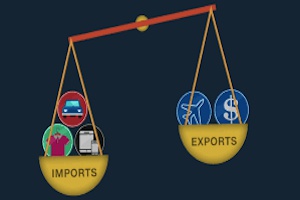
The concept of a trade deficit is often negatively connoted and distorted by approximate, erroneous or contradictory conceptions. It is obviously complicated to explain to a wide public that imports are necessary for the proper functioning of an economy, that a trade deficit can result from a phase of prosperity and that tariffs can only effectively reduce a deficit at the cost of a recession. lire la suite
-
10 janvier 2025
Trump the Second: from the Imperial Presidency to the Imperiled Republic

How dangerous will Donald M. Trump’s second term be? This article claims that he is seeking to undermine the fundamental elements of American government created by the Constitutional Convention in 1787 and poses the greatest threat to America’s republican system of government since the Civil War of 1861-65. lire la suite
-
21 novembre 2024
The significance of Trump's victory

Any Democratic Party candidate would have faced a daunting challenge in 2024. Political scientists have found that the two most reliable indicators of an incumbent party’s chance for re-election are voters’ evaluation of whether the country is going in the right direction, and whether voters judge that they are better off today than in the past. Still, despite the substantial odds against a Harris victory, the election was extremely close. lire la suite
-
24 juillet 2023
Memorial: War of Memories

Memorial, Nobel Peace Prize 2022 shared with Ales Bialiatski, Belarusian human rights activist in prison, and the Ukrainian Center for Civil Liberties, has been witnessing since 1991 all the upheavals of civil society in Russia and its former empire. lire la suite
-
25 octobre 2022
Stalemate or reaction? The Midterm Elections and their discontents

How will the Republican Party use its new-found power if, as is near-certain, it gains control of one or both houses of Congress in the November midterm elections. Common wisdom about the American system of separated powers holds that divided control of Congress and the presidency produces stalemate, a freezing of the status quo. I suggest, on the contrary, that the result will be substantial: Republicans will use their congressional power not simply to block presidential initiatives but to reshape American politics and policy in reactionary, ultra-rightist, and anti-democratic directions. lire la suite
-
21 juin 2022
If I wanted to go to there, I wouldn’t start from here
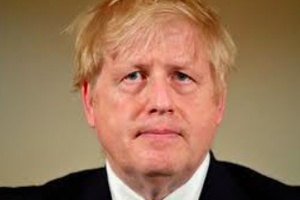
The quote above is an anecdotal story of an Irishman giving an Englishman travel directions… and after twelve years of Conservative led governments I’m not sure that it is an inappropriate summary of how the United Kingdom got to where it is today. Nor am I sure where ‘there’ is either, given the current state of world affairs, continuing Covid issues and post Brexit difficulties. What the UK faces at the moment is a crisis of government at the centre of which are concerns about its leader, Boris Johnson. lire la suite
-
6 mai 2021
UK: there’s something in the air – and it does not smell too good!
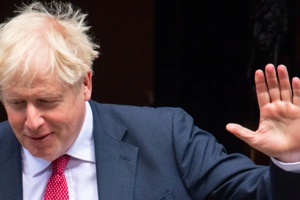
Despite its success with the vaccine campaign, the British government has not really had a good time since the outbreak of the Covid pandemic, nor since the United Kingdom left the European Union, whilst most recently it has found itself mired in a series of damaging leaks about the way in which it conducts its relation with certain business interests. Three areas of activity suggest a government which will not be known by historians for its competence and even its honesty. lire la suite
-
16 février 2021
Claims of electoral fraud are as American as apple pie
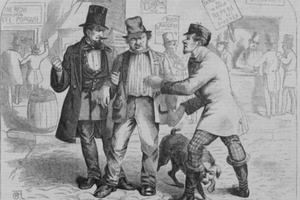
For a non-American observer, US presidential elections can be quite surprising. On top of a system of Electors and swing states, voting by mail or without a voter ID seems an open door for fraud. But claims of electoral fraud are nearly as ancient as the US democracy, and point to the conflicting views of many voters towards immigration and minorities. Federalism prevents any harmonization across states. lire la suite
-
20 janvier 2021
Facebook, Twitter, ending the hypocrisy

Can Twitter and Facebook still say, after censoring the President of the United States, that they have no editorial responsibility for the content they publish? To ask the question is to answer it. This calls for enhancing regulation. But how? lire la suite
-
29 mars 2019
Let’s not oppose climate policies and purchasing power! Lessons from the French climate transition

Rising green taxes on gasoline initially sparked the “Yellow Jackets” movement in November 2018. The winter of discontent that came with the tax riots reminds us of the importance of reconciling protection of purchasing power with that of the climate. lire la suite
-
19 juillet 2018
Drowning, not waving: the UK and Brexit
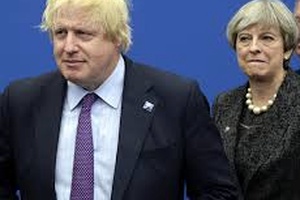
So far Mrs May has been able to hold her party together – there currently seems to be no desire for a leadership challenge from those dissatisfied with her proposals, and there is no readily apparent leader in waiting. A challenge may come later in the year, especially if the government is seen as making any further concessions to the EU. Meanwhile preparations for a No Deal outcome are under consideration. Thus, the British government is not quite drowning and is certainly not waving. But its boat is certainly unstable. lire la suite
-
23 novembre 2011
Can Technocratic Government be Democratic?

The resignations of Papandreou in Greece and Berlusconi in Italy, replaced by technocratic governments, have raised questions about the democracy of technocracy. These questions only gain in intensity when we add the EU Commission’s increasing powers of surveillance of member states’ national budgets, let alone those of the Troika (IMF, European Central Bank, and EU Commission) when it comes to eurozone member states that have had recourse to loan bailouts (Greece) or to the European Financial Stability Facility (EFSF). The answers to such questions are mixed. Berlusconi's replacement with a technocratic government—precipitated primarily by global market pressures—may actually be a sign of democracy at work. Papandreou's replacement—precipitated by the pressures of the eurozone powers and Papandreou’s own ill-advised gamble on ‘direct democracy’—depends upon how things play themselves out. As for the technocratic governance of the EU, this is where the democracy deficit may be greatest. lire la suite
-
4 février 2011
Energy: Nabucco’s comeback

Since its launching in 2002, the Nabucco pipeline project has had several lives. Many times it was given as death, but it finally managed to rise from its own ashes. Even though the Russian-Ukrainian gas crisis in 2006 transformed Nabucco into a top priority European project, in the last few years it advanced a little but backed up a lot, resulting in barely concealed mockery. This pattern is true and depicts Nabucco’s situation before the economic crisis. The latter, with its negative effects, brought a breath of fresh air for the European project and its proponents have used it rather wisely. The latest developments in Azerbaijan and Turkmenistan are encouraging with regard to the equation of supply sources. It seems that Nabucco is back. lire la suite
-
4 novembre 2010
The 2010 French pension reform

The 2010 French pension reform has now been passed by the French Parliament, after weeks of protests, strikes and even riots, all of which have aroused incomprehension in foreign media. The headline increase of the “legal retirement age” from 60 to 62 sounded to most pundits a very small step towards the sustainability of public finances when many European countries have already increased normal retirement age to age 67 or even 68. This short piece is not about the reasons behind the acute reaction of the French street – which would encompass much more than pensions. It aims simply at presenting the reform, its likely distributional impact and its effect in terms of financial sustainability. (in French; Italian version on LaVoce, English version to be published on VoxEU). lire la suite
-
1 octobre 2010
Beyond New Labour?

This week, the Labour Party’s annual conference was marked by the inaugural speech of its new leader, Ed Miliband. The campaign for the leadership of the Labour Party had been perilously close: Ed Miliband only emerged as leader after four rounds of voting. His brother, David Miliband, former Foreign Minister in the government of Gordon Brown, had been the favourite to win the election. Keen to appease the tensions that the campaign had unleashed within the Party, Ed Miliband’s first speech as leader was a reconciliatory affair: the Guardian newspaper warmly described him as staking out the reformist centre-ground, much like Tony Blair had done in the mid 1990s. But what of New Labour? And what future for the British left? lire la suite
